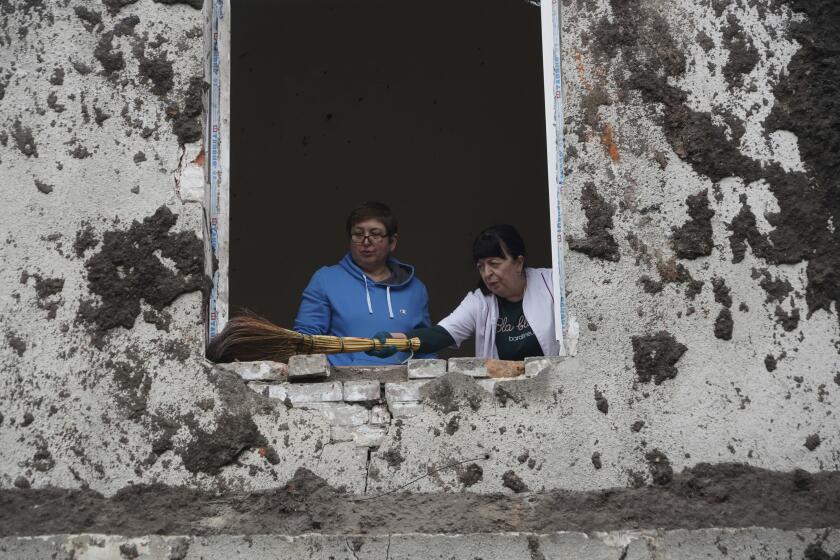Lebanon leaders take steps to calm conflict with Hezbollah
Lebanon’s political and military leaders struggled to pull the country back Saturday from a deepening civil conflict that has left at least 34 people dead in four days of violence between Iranian-backed militias and supporters of the pro-U.S. government.
By late Saturday afternoon, the government appeared to have backed away from the political decree that sparked the confrontation. And the Shiite militia Hezbollah had given up its control of West Beirut, which it had seized a day earlier in an offensive that stunned Lebanese and sent shock waves across the region.
But throughout the day, there were ominous signs of aggression in a country still haunted by its long civil war, including the tit-for-tat sectarian attacks that characterize the Sunni-Shiite conflict in Iraq. At a late morning funeral for a victim of the previous day’s violence, a gunman believed to be Shiite opened fire on Sunni mourners in the procession who had trashed his shop. Two men were killed.
Militiamen of Lebanon’s Druze sect also were suspected of torturing and shooting at least two Shiite Hezbollah supporters southeast of the capital. The corpses were dumped in front of a hospital.
And in and around the northern coastal city of Tripoli, fighting between pro- and anti-Syrian political groups left 12 people dead.
The violence comes amid heightened regional tensions between the U.S. and Saudi Arabia, which strongly back the government, and Iran and Syria, which support Hezbollah and the opposition.
But a measure of calm returned after Prime Minister Fouad Siniora publicly asked the army to intervene.
“We request the army to fulfill their role in protecting the Lebanese,” he said in a televised speech. “I ask them to enforce stability in all the regions and take the arms from the streets, end the sit-in and bring back life to the capital and Lebanon.”
Afterward, olive-clad army soldiers flooded into West Beirut to claim positions that had been seized a day earlier by Hezbollah, which faded back to its strongholds south and west of central Beirut.
The army won the respect of Lebanon’s political factions last year for defeating an Al Qaeda-linked group holed up in a Palestinian refugee camp near Tripoli. It is viewed as the one Lebanese institution not beholden to partisan interests.
The Hezbollah-led opposition said it would abide by the army’s request and “cancel all shows of armed force” in the capital, but vowed to continue acts of “civil disobedience,” which include blocking off the city’s main airport, a move that has halted flights in and out of the country.
Almost as quickly as they had appeared and seized control of West Beirut, Hezbollah and its allied Shiite militiamen disappeared, driving away in late-model sport utility vehicles without license plates.
The escalation of Lebanon’s months-long political standoff began Tuesday when the government outlawed Hezbollah’s private fiber-optic network and ordered the removal of its allied head of airport security.
Hezbollah responded by launching a fiery offensive on the Lebanese capital, targeting the political offices and media outlets of the government’s Druze and Sunni backers and demanding that Siniora rescind the decision.
The government relented somewhat by placing the ban orders in the hands of the army, which has long affirmed its support for Hezbollah’s mission to resist what Lebanese describe as decades of Israeli aggression.
The army issued a statement saying that in effect it would not enforce the government’s decisions.
“After placing the two decisions related to the security apparatus of the airport and the telecommunications network in the hands of the army, we’re treating them as if they were never issued by the government,” the statement said.
“The army command announces that it will keep the head of security at the airport and deal with the issue of the telephone network in a way not to harm the public interest and the security of the resistance,” the statement said.
To many, it appeared that the government was trying to back down from its position without losing face by formally rescinding the orders, which Hezbollah said challenged its ability to confront Israel.
“The government’s having stepped down is not humiliating if it is an issue of peace,” said Walid Jumblatt, the Druze leader who first began beating the drums about the contentious issues of Hezbollah’s telecommunications network and airport security early this month.
“We are trying to, slowly but surely, build the state of Lebanon. . . . We do not want Hezbollah to feel that we are conspiring against them with the Israelis.”
--
--
Times special correspondents Raed Rafei, Davigh Karamanoukian and Nadeem Azzawi contributed to this report.
More to Read
Start your day right
Sign up for Essential California for news, features and recommendations from the L.A. Times and beyond in your inbox six days a week.
You may occasionally receive promotional content from the Los Angeles Times.






